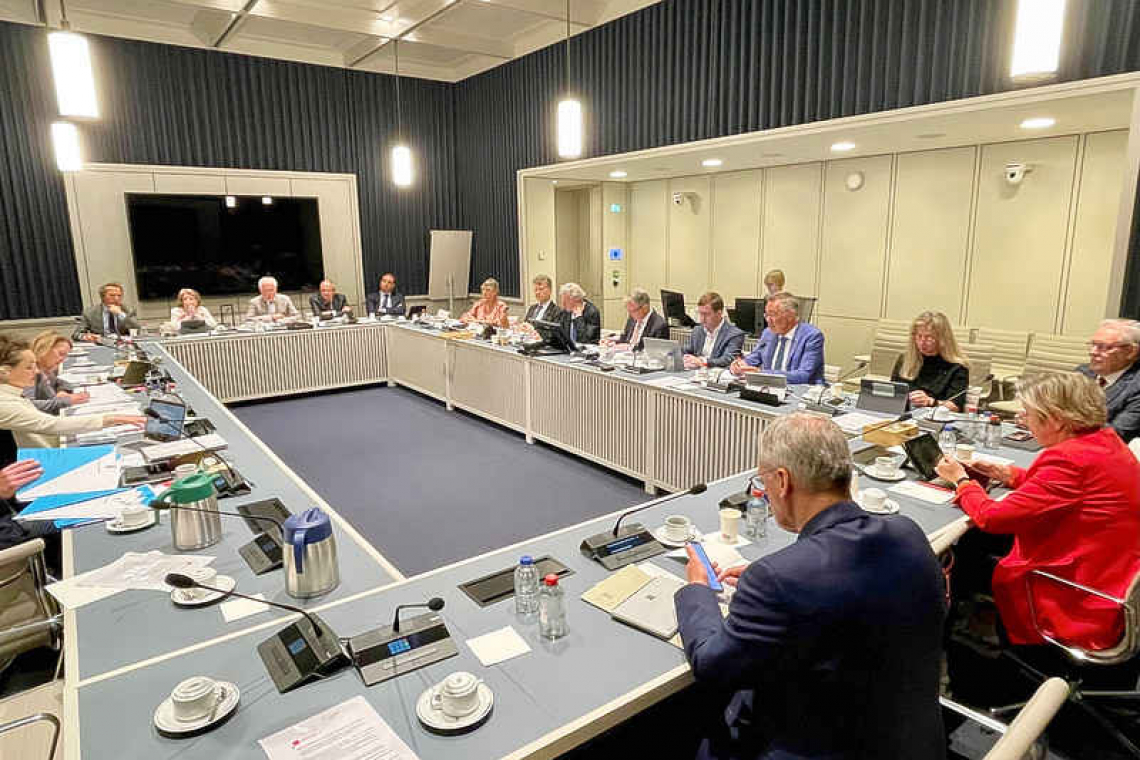The Senate’s Permanent Committee for Kingdom Relations during the debate with State Secretary Alexandra van Huffelen.
THE HAGUE--Dutch State Secretary of Kingdom Relations and Digitisation Alexandra van Huffelen is prepared to discuss the 12.5 per cent cut to the labour conditions of employees in the (semi) public sector in Curaçao and St. Maarten, and the 12.6 per cent in Aruba, with the governments of the countries.
The state secretary said this in a debate with the First Chamber of the Dutch Parliament, the Senate, on Tuesday. “The three Caribbean countries want to let go of the 12.5 per cent. The Kingdom Council of Ministers wants to hold on to that for now, but is prepared to look at other possibilities to accomplish this.”
Van Huffelen said she would be discussing the matter of the cut to the labour conditions when she met with the governments during her visit to the three countries in May, and would find a joint solution before this summer.
Several members of the Senate’s Permanent Committee for Kingdom Relations asked about the 12.5 per cent cut of the labour conditions of employees in the (semi) public sector in the Dutch Caribbean that the countries had to implement as part of the conditions to receive liquidity support during the COVID-19 pandemic.
Senators Peter Ester of the ChristianUnion, Boris Dittrich of the Democratic Party D66 and Paul Rosenmöller of the green left party GroenLinks enquired about the 12.5 per cent. The senators wanted to know if it was possible to differentiate, whereby those who earned more would contribute more.
Too generic
Senator Ester called the 12.5 per cent “too generic” and pointed out that employees with lower salaries were already barely able to make ends meet. “Would it not have been better to cut the higher salaries and to spare the lower salaries?” he asked.
State Secretary van Huffelen explained that the countries were allowed to choose in what way the cut was implemented, as long as the total wage sum went down. She said that in fact, the countries had given content to this condition in various ways.
Van Huffelen acknowledged that the pay cuts especially hurt those employees who earned less, and even more so during these times when the cost of living has been rising. “This is a very big burden for them. I will discuss this with the countries and see how we can solve this together before the summer,” she said.
The senators during Tuesday’s debate also mentioned the criticism by the Dutch Caribbean parliaments of the Consensus Kingdom Law proposal to establish the Caribbean Body for Reform and Development COHO.
Worrisome situation
“The governments have different opinions on this matter. The Caribbean parliaments are very critical. What if it doesn’t work out with the COHO? This is a worrisome situation,” said Senator Annemarie Jorritsma of the liberal democratic VVD party. Peter Schalk of the Christian Reformed Party SGP said the recent critical messages about the COHO were “not very hopeful.”
Senator Ria Oomen of the Christian Democratic Party CDA said the reforms were necessary, but that she had the feeling not everyone seemed to share that urgency. “We are at the start of a very important process to implement the reforms in the countries. The problems in the countries are big and for many people the situation is very urgent,” said Senator Toine Beukering of the Group Nanninga.
Senator Jeroen Recourt of the Labour Party PvdA said he was shocked to see the state of the countries, which he said had become worse since the pandemic. He asked what lessons had been learned from the policy and dealings of The Hague to solve the issues in the countries.
Tensions
Dittrich of D66 said the reforms and the COHO were not being imposed by The Hague, but he did acknowledge that there were tensions. He hoped the technical briefings for the Dutch Caribbean parliaments would help to eliminate the tensions and misunderstandings.
Rosenmöller of GroenLinks said he hoped the state secretary could bring the COHO Kingdom Consensus Law to a positive outcome, in good consultation with the countries. Rosenmöller suggested organising a Kingdom conference which could help to “create more trust and reduce the distrust.” He said parties should not forget that the interest of the people on the islands came first.
Senator Peter Nicolaï of the Party for Animals PvdD qualified the way that The Hague treated the countries as “degrading”. He specifically mentioned the COHO, the Dispute Regulation and the COVID-19 crisis. “The countries had to sign at the X. They could not say no and were forced into a position. That is called humiliation.”
According to Nicolaï, former State Secretary of Kingdom Relations Raymond Knops tended to treat the countries in a degrading way. Senator Jorritsma took offence to this qualification. “The previous state secretary is being slaughtered here and I object to that,” she said, adding that the reforms were not fabricated by The Hague.
Disguised intrusion
The COHO is not a disguised intrusion by The Hague, the state secretary assured the Senate during the debate. “Together with the countries we are looking at implementing the reforms. It is always a bit thrilling when someone is looking over your shoulder, and it can lead to discussions. It is important to carefully look at these things.”
The state secretary said that during her visit to the islands in a couple of weeks, she would like to speak with the governments and parliaments to find solutions and discuss the bottlenecks. She said her objective was not to force the reforms through, but to implement them in consensus.
The ultimate goal remained to strengthen economic development and the social fabric in the best interest of the people on the islands, Van Huffelen said. She said she also wanted to discuss with the countries what they wanted for the long term, and to do this through more frequent consultations.







